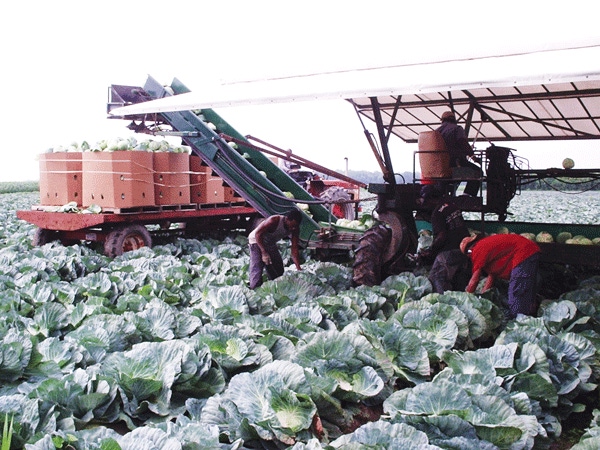March 1, 2011

For nearly 20 years, three farms — Alligator River Growers, Tunnel Farms and Carawan Farms — located by North Carolina’s Pamlico Sound have collectively grown, harvested, and marketed a variety of produce crops.
On approximately 4,000 fertile acres, they supply much of the East Coast with snap beans, sweet corn, cabbage, cucumbers, eggplant, zucchini and squash.
Wilson and Debbie Daughtry, owners of Alligator River Growers in Engelhard, N.C., on behalf of the grower group and Parker Farms, in southeastern Virginia, took the initiative to apply for a North Carolina Value-Added Cost Share (NCVACS) award to assist them in preparing for a USDA Value-Added Producer Grant. The federal grant allows applicants to apply for up to $300,000 in matching grant funding that would provide working capital to help ensure the success of their processing business for fresh produce.
NCVACS is administered by N.C. MarketReady, a program of North Carolina Cooperative Extension, located at the North Carolina Research Campus in Kannapolis.
The cost share program, funded by the North Carolina Tobacco Trust Fund Commission, was launched in 2009 to encourage more North Carolina producers to apply for the VAPG federal funds and to generate more competitive applications.
The first cycle of NCVACS was designed to provide supplemental funding for producers to work with professionals who provide grant writing services and perform feasibility assessments.
The Daughtry’s award consists of a $3,500 cost share for grant writing assistance for the VAPG-Working Capital grant and $20,000 for a feasibility assessment. This funding will offset the cost of these services by approximately half.
The dark, fertile soil just inland of the Pamlico Sound supports an array of crops including snap beans, sweet corn, broccoli and lettuce.
By further processing their fresh produce, these growers plan to tap into the demand for convenience and be ahead of the impending fresh produce safety regulations.
Snap beans first up
The first crop they plan to focus on is snap beans. The producers grow a spring and fall crop of snap beans. The harvested beans will be washed, end-snipped, bagged and ready to cook for consumers and the food service industry.
Market research has assessed the need for controlled-atmosphere packaging and multiple bag sizes (2 pound, 5 pound and 10 pound) to suit the various target markets. The packaging will extend the shelf life of the beans and reduce prep time for the consumer or chef. Greater convenience of using fresh produce is expected to increase consumption.
In most grocery stores, snap beans are currently washed, crated and displayed loose on the produce shelf. Individual customers typically use their bare hands to bag the quantity of beans they want to purchase. The risk of exposure to contamination by a pathogen carried on someone’s hand would be eliminated by offering a bagged product.
While there are no current regulations that address this risk, there is pending legislative action that could affect the open shelf display of fresh produce. These producers see the opportunity to help lead the industry toward an alternative display option.
The group currently is seeking a facility to run year-round, using their products and some sourced from others. North Carolina-grown produce is available from early June through late November. In addition to snap beans they plan to add other products such as tray-packed sweet corn and broccoli florets.
Along with the three North Carolina producers who currently make up the Hyde County producer group, Rod Parker, owner of Parker Farms in Oak Grove, Va., will also contribute raw product and manage the sales and distribution of the value-added products. Since they already have an established presence in the retail market with their fresh product, he believes it will be a simple matter of asking retailers to consider a new product package.
With the help of NCVACS and funding from the USDA, the Daughtrys hope to establish a more solid future for these participating farmers. They will capture more value, ensure their product remains marketable and move toward managing nearly all aspects of the supply chain for their product, from the production on the farm to a value-added product on the grocery shelf.
You May Also Like




